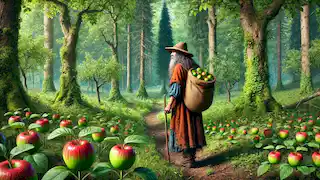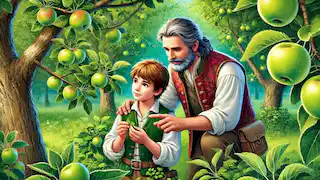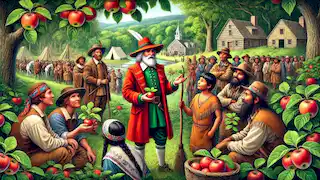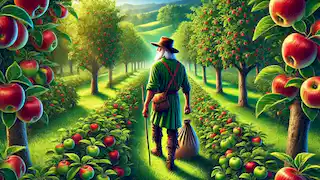Johnny Appleseed
Reading Time: 9 min

About Story: Johnny Appleseed is a Legend from united-states set in the 19th Century. This Descriptive tale explores themes of Nature and is suitable for All Ages. It offers Inspirational insights. "Discover the legendary journey of Johnny Appleseed and his lasting legacy." .
Johnny Appleseed, born John Chapman on September 26, 1774, in Leominster, Massachusetts, became one of America's most cherished folk heroes. His legend grew out of his life as an itinerant orchardist who traveled the American frontier, planting apple trees and spreading a message of conservation and kindness.
John Chapman's early life was not particularly remarkable. He grew up in a modest household with his father, Nathaniel Chapman, who was a Minuteman at the Battle of Concord, and his mother, Elizabeth Simonds. Sadly, Elizabeth died in 1776 when John was just two years old, and Nathaniel remarried Lucy Cooley. The family moved to Longmeadow, Massachusetts, where John spent his formative years.
From a young age, John showed a deep appreciation for nature. He often wandered through the woods, fascinated by the flora and fauna around him. His stepmother, Lucy, encouraged his curiosity and taught him about plants and their medicinal properties. This early education instilled in him a lifelong passion for botany and horticulture.

As a young man, John apprenticed with a local orchardist. Here, he learned the intricacies of planting and caring for apple trees. The apple, a versatile and hardy fruit, captivated John. He saw its potential to nourish and sustain people, especially those moving westward into the expanding frontier. In the late 1790s, John decided to embark on a journey that would define his legacy.
Traveling westward, John Chapman became known as Johnny Appleseed. He roamed the Ohio River Valley, planting nurseries of apple trees. Unlike popular belief, he did not scatter seeds randomly. Instead, he established nurseries, fenced them in to protect them from livestock, and entrusted them to local settlers to care for until his return.
Johnny Appleseed was not just a planter of trees but also a devout follower of the Swedenborgian faith, a Christian denomination based on the teachings of Emanuel Swedenborg. This faith preached a deep respect for all living things, which resonated with Johnny's love for nature. He believed that by planting apple trees, he was spreading God's love and providing a lasting benefit to humanity.

Johnny Appleseed's appearance and demeanor added to his legend. He was often described as a gaunt man with a wiry frame, long hair, and a distinctive outfit that included a tin pot for a hat, a coffee sack with holes for his arms, and no shoes. This unconventional attire, combined with his gentle and generous nature, endeared him to settlers who saw him as a kind of rustic saint.
As he traveled, Johnny Appleseed became a well-known figure on the frontier. He bartered apple seeds and saplings for food, clothing, and other necessities. In return, he shared stories, news, and his wisdom about apple cultivation and nature. His knowledge and kindness earned him the trust and friendship of many settlers, Native Americans, and children, who delighted in his tales and gentle presence.
Despite his humble lifestyle, Johnny was a savvy businessman. He strategically planted his nurseries ahead of the waves of westward migration, ensuring that his apple trees would be ready to provide fruit to the new settlers. He acquired and managed large tracts of land, though he often gave away trees to those in need. His apple nurseries provided a valuable food source and contributed to the establishment of sustainable communities.

Johnny Appleseed's life was not without challenges. He faced harsh weather, wild animals, and the constant threat of illness. Yet, he remained undeterred, driven by his mission to cultivate apple trees and spread goodwill. His efforts were instrumental in the spread of apple orchards across Ohio, Indiana, and Illinois.
One of Johnny's significant contributions was promoting the use of apples for cider rather than for eating. The apples he planted were typically small and tart, better suited for making hard cider, a staple drink for early settlers. This emphasis on cider apples helped ensure the survival and success of many frontier communities, providing a reliable source of refreshment and sustenance.
Despite his considerable landholdings and nurseries, Johnny Appleseed lived a frugal life. He was known for his simplicity and generosity, often giving away his possessions to those in need. He saw wealth not in material terms but in the number of trees he planted and the positive impact he had on others' lives.
In his later years, Johnny Appleseed continued to roam the frontier, planting apple trees and spreading his message of peace and kindness. He remained a beloved figure, welcomed by settlers and Native Americans alike. His dedication to his mission and his unwavering belief in the goodness of humanity left an indelible mark on the American frontier.
Johnny Appleseed passed away in March 1845 near Fort Wayne, Indiana. His legacy, however, lived on. The apple orchards he planted continued to thrive, and his story became a cherished part of American folklore. He embodied the spirit of exploration, conservation, and generosity that defined the American frontier experience.
Today, Johnny Appleseed is remembered not just for his apple trees but for his example of how one person's dedication and kindness can make a lasting difference. His life reminds us of the importance of living in harmony with nature, helping others, and leaving a positive legacy for future generations.
John Chapman, known later as Johnny Appleseed, grew up amidst the backdrop of the American Revolutionary War. This tumultuous time influenced his family's life deeply. Nathaniel Chapman, his father, was a patriot and fought bravely in the Battle of Concord. After the war, Nathaniel returned to find his family struggling. They moved to Longmeadow, Massachusetts, in search of a new beginning.

Young John was curious and adventurous. The forests around Longmeadow were his playground, and he spent countless hours exploring them. His stepmother, Lucy Cooley, nurtured his curiosity about plants. She had a small garden where she grew medicinal herbs, and she often taught John about their uses. This early education was crucial in shaping John's future path.
John's apprenticeship with a local orchardist in his teenage years marked the beginning of his deep connection with apple trees. He learned how to graft trees, a technique that involves joining two plants together so they grow as one. This method was essential for producing apples that were true to type, meaning they retained the desirable characteristics of the parent plant. John mastered these skills and developed a profound respect for the apple tree, seeing it as a source of sustenance and beauty.
As John grew older, he felt the pull of the frontier. The United States was expanding westward, and John saw an opportunity to make a difference. In the late 1790s, he left Massachusetts and headed west, determined to bring apple trees to the new settlers. His journey took him through Pennsylvania, Ohio, Indiana, and Illinois.
Johnny Appleseed became a familiar figure along the frontier. He traveled light, carrying only the essentials. His outfit was unconventional but practical: a coffee sack with holes for his arms, a tin pot for a hat, and no shoes. This attire, along with his long hair and gentle demeanor, made him a distinctive and memorable character.
Johnny's mission was not just about planting trees; it was about spreading a message of conservation and kindness. He believed that by planting apple trees, he was providing a lasting benefit to humanity. The trees he planted were primarily for cider production, which was a staple drink for early settlers. Cider was safer to drink than water, which was often contaminated, and it provided much-needed calories and nutrients.
Johnny's approach to planting was methodical. He did not simply scatter seeds randomly. Instead, he established nurseries in strategic locations. He fenced them in to protect them from livestock and entrusted them to local settlers to care for until his return. This ensured that the trees had a better chance of survival and could provide a reliable food source for the settlers.
Johnny's devotion to his mission was evident in his lifestyle. He lived simply, often giving away his possessions to those in need. He saw wealth not in material terms but in the number of trees he planted and the positive impact he had on others' lives. His generosity and kindness earned him the respect and admiration of many settlers and Native Americans.
Johnny Appleseed's faith played a significant role in his life. He was a devout follower of the Swedenborgian faith, which preached a deep respect for all living things. This belief resonated with Johnny's love for nature and his mission to plant apple trees. He saw his work as a way to spread God's love and provide a lasting benefit to humanity.
As Johnny traveled, he became a well-known figure on the frontier. He bartered apple seeds and saplings for food, clothing, and other necessities. In return, he shared stories, news, and his wisdom about apple cultivation and nature. His knowledge and kindness earned him the trust and friendship of many settlers, Native Americans, and children, who delighted in his tales and gentle presence.
Despite the challenges he faced, including harsh weather, wild animals, and the constant threat of illness, Johnny remained undeterred. His dedication to his mission and his unwavering belief in the goodness of humanity left an indelible mark on the American frontier.
One of Johnny's significant contributions was promoting the use of apples for cider rather than for eating. The apples he planted were typically small and tart, better suited for making hard cider. This emphasis on cider apples helped ensure the survival and success of many frontier communities, providing a reliable source of refreshment and sustenance.
In his later years, Johnny continued to roam the frontier, planting apple trees and spreading his message of peace and kindness. He remained a beloved figure, welcomed by settlers and Native Americans alike. His dedication to his mission and his unwavering belief in the goodness of humanity left an indelible mark on the American frontier.
Johnny Appleseed passed away in March 1845 near Fort Wayne, Indiana. His legacy, however, lived on. The apple orchards he planted continued to thrive, and his story became a cherished part of American folklore. He embodied the spirit of exploration, conservation, and generosity that defined the American frontier experience.
Today, Johnny Appleseed is remembered not just for his apple trees but for his example of how one person's dedication and kindness can make a lasting difference. His life reminds us of the importance of living in harmony with nature, helping others, and leaving a positive legacy for future generations.

















